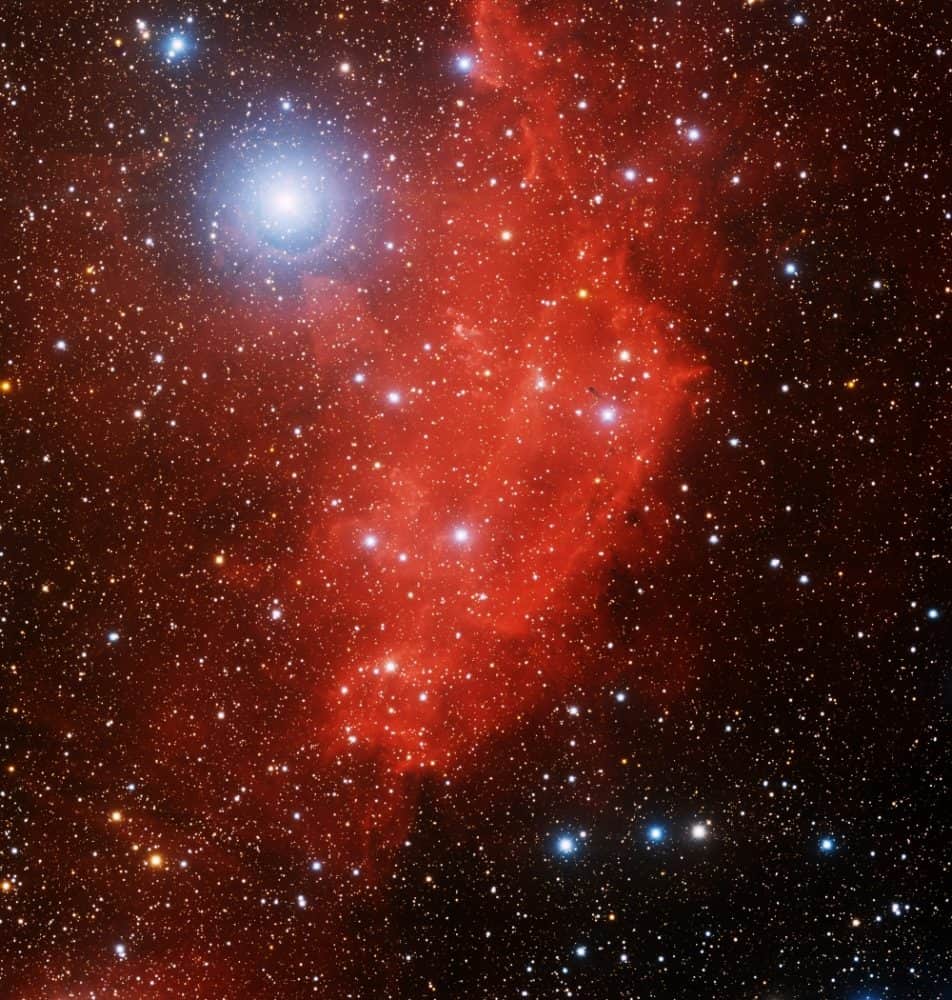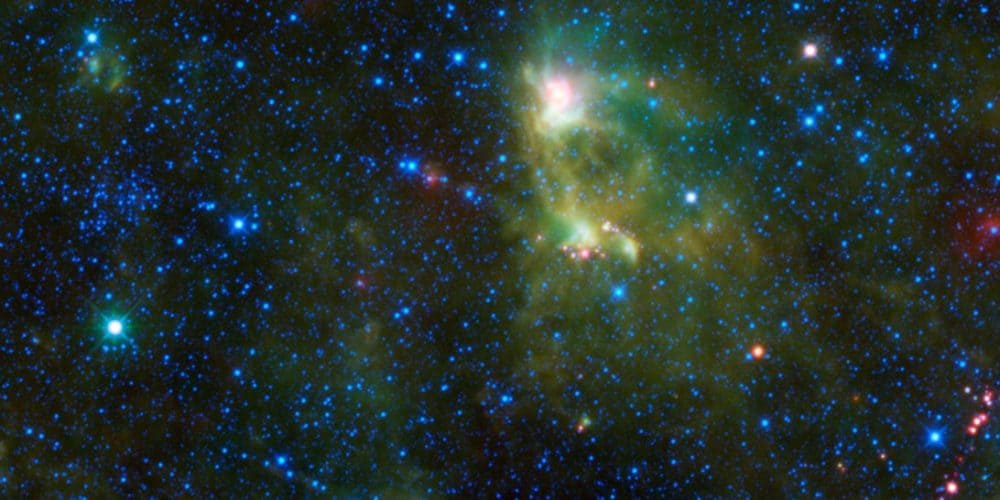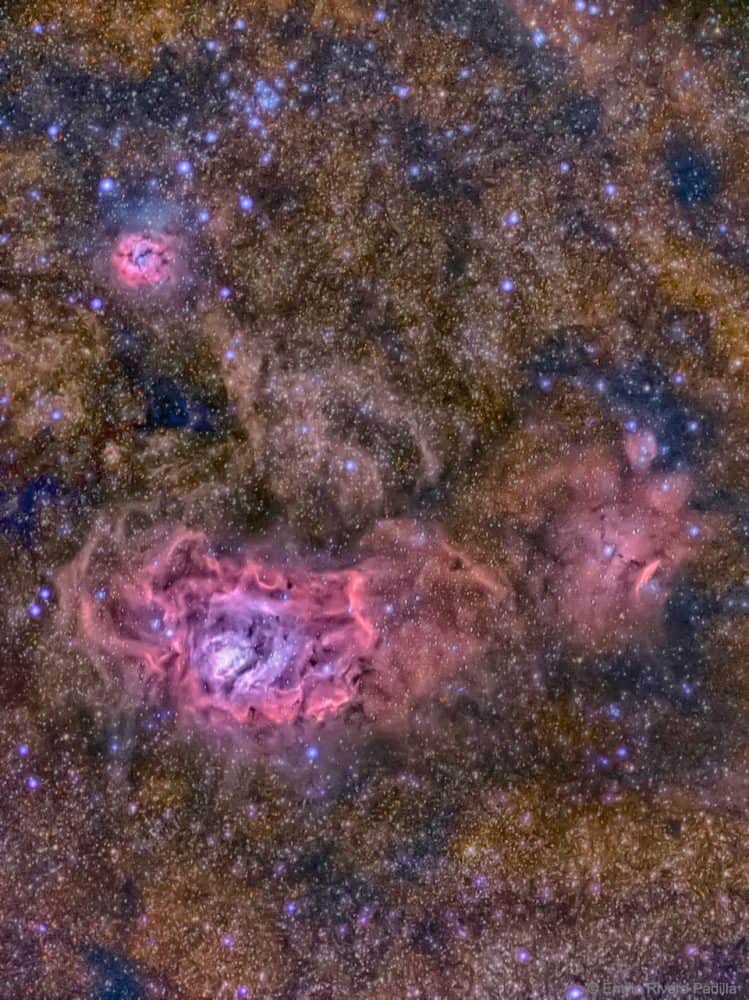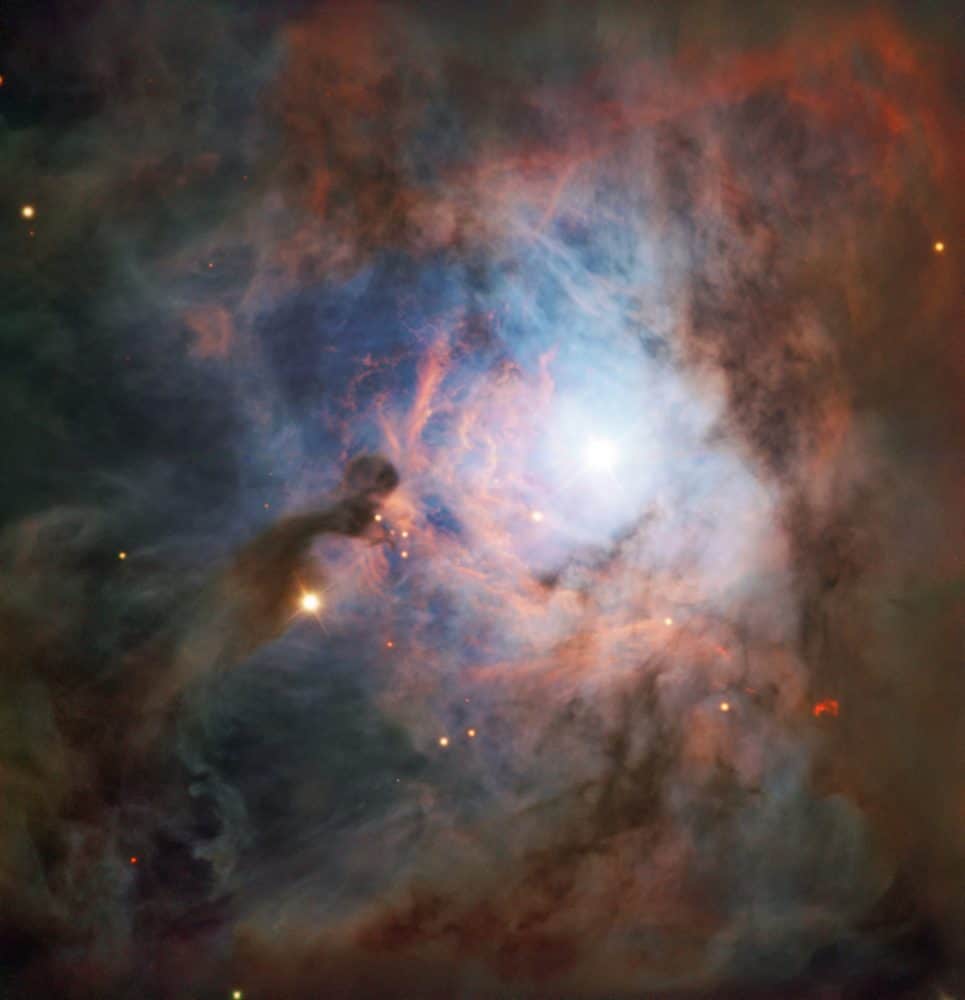Blog
https://www.youtube.com/watch?v=0XHJvRr7TR4&list=PLF183036912DCA301&index=2&t=0s
more...This image was obtained with the wide-field view of the Mosaic camera on the Mayall 4-meter telescope at Kitt Peak National Observatory. Sh2-282 is an HII emission nebula. The red hydrogen gas is energized by the intense light from the bright blue stars that surround it. Several pillars can be seen embedded in the gas that are being sculpted from the radiation and solar wind from the bright blue star in the upper-left corner of the image. The image was generated with observations in the B (blue), I (orange) and Hydrogen-Alpha (red) filters. In this image, North is up, East is to the left.
Sh2 -282 is a visible emission nebula in the constellation of the Unicorn .
It is observed in the central-northern part of the constellation, about 3 ° south of the Rosetta Nebula ; it can be photographed with some difficulty through a high-powered amateur telescope equipped with special filters and long exposures are required. Being only 1.5 degrees north, it can be observed from all populated areas of the Earth with ease; the most favorable period for its observation in the evening sky is from December to April.
It is an H II region extended for about 50 light years , inside which several cometary structures are known, which indicate the presence of erosive phenomena caused by the stellar wind of the nearest massive spectral stars O and B, and in particular of HD 47432, a variable bluepulsating giant visible on the northeastern side of the nebula; this star has an average magnitude of 6.21 and is located at a distance of 1250 parsecs (4075 light years). The cloud is in the same galactic environment as the Monoceros OB2 association, linked to the Rosetta Nebulaand located on the inner edge of the Perseus Arm , and of which the HD 47432 star would also be a part; the nebulous system also includes NGC 2282 , a reflection nebula placed a little further to the east.
more...Famoudou Don Moye, (born May 23, 1946) is an American jazz percussionist and drummer. He is most known for his involvement with the Art Ensemble of Chicago and is noted for his mastery of African and Caribbean percussion instruments and rhythmic techniques.
https://www.youtube.com/watch?v=LpzxqsrpAb4
more...
Leslie Spann Jr. (May 23, 1932 – January 24, 1989) was an American jazz guitarist and flautist. Les Spann was born in Pine Bluff, Arkansas. From 1950–1957, he studied music at Tennessee State University. At the end of that time he worked with Phineas Newborn Jr. and in 1958 with Ronnell Bright. The following year, he joined a quintet in New York City led by Dizzy Gillespie, performing solos on flute and guitar and appearing on two of Gillespie’s albums for Verve Records. After a year with Gillespie, he went to Europe as a member of Quincy Jones‘s big band. Two more albums followed, this time with Spann joining a sextet that included Duke Ellington, Johnny Hodges, and Harry “Sweets” Edison. He recorded with Hodges again in 1967, then disappeared from the music world. He died in New York City in 1989.
As a sideman he recorded with Nat Adderley, Benny Bailey, Bill Coleman, Eddie “Lockjaw” Davis, Curtis Fuller, Red Garland, Benny Goodman, Sam Jones, Abbey Lincoln, Charles Mingus, Duke Pearson, Jerome Richardson, Charlie Shavers, Sonny Stitt, Billy Taylor, Randy Weston, and Ben Webster. As a leader he recorded only once, the album Gemini in 1960.
more...https://www.youtube.com/watch?v=vp9y0Sj-fdM
more...Researchers at the University of Bonn in Germany and the Russian Academy of Sciences have spotted an incredibly unusual and rare star in the middle of a cloud of gas around 10,000 light years from Earth.
The star, dubbed J005311, appears to have risen from its cosmic grave after two dead stars collided with one another in the constellation Cassiopeia. The findings, published in Nature on May 21, reveal the nature of the exotic zombie star and its unusual properties. The team discovered the bizarre object using data from NASA’s Wide-field Infrared Survey Explorer (WISE) space telescope and subsequently observed it using a ground-based telescope at Russia’s Special Astrophysical Observatory.
At the end of a small star’s lifetime, when all of its fuel has been exhausted, it turns into a “white dwarf” — a tiny, dense, dead star. For the most part, a white dwarf is done for after that. However, researchers at Bonn examined the radiation emitted by the strange star and found that it was lacking in both hydrogen and helium, usually present in a white dwarf.
Due to J005311’s unusual emission signal, the researchers suspect what they’ve detected is the result of a cosmic fusion between two white dwarfs that circled one another for billions of years.
more...Peter Nero (born Bernard Nierow, May 22, 1934) is an American pianist and pops conductor. He directed the Philly Pops from 1979 to 2013, and has earned two Grammy Awards.
Born in Brooklyn, New York, as Bernard Nierow, he started his formal music training at the age of seven. He studied piano under Frederick Bried. By the time he was 14, he was accepted to New York City’s High School of Music & Art and won a scholarship to the Juilliard School of Music.Constance Keene, his teacher and mentor, once wrote in an issue of Keyboard Classics “Vladimir Horowitz was Peter’s greatest fan!” He graduated from Brooklyn College in 1956.
Nero recorded his first album under the name of Bernie Nerow in July 1957 under the Mode label MOD-LP117 which shows his technical virtuosity in the jazz genre. Nero recorded an album in 1961, and won a Grammy Award that year for Best New Artist. Since then, he has received another Grammy, garnered 10 additional nominations and released 67 albums. Nero’s early association with RCA Victor produced 23 albums in eight years. His subsequent move to Columbia Records resulted in the million-selling single and album Summer of ’42.
more...Le Sony’r Ra (born Herman Poole Blount, May 22, 1914 – May 30, 1993), better known as Sun Ra, was an American jazz composer, bandleader, piano and synthesizer player, and poet known for his experimental music, “cosmic” philosophy, prolific output, and theatrical performances. For much of his career, Ra led “The Arkestra”, an ensemble with an ever-changing name and flexible line-up.
Born and raised in Alabama, Blount became involved in the Chicago jazz scene during the late 1940s. He soon abandoned his birth name, taking the name Le Sony’r Ra, shortened to Sun Ra (after Ra, the Egyptian God of the Sun). He developed a complex persona and an idiosyncratic, myth-based credo that would make him a pioneer of Afrofuturism. He claimed to be an alien from Saturn on a mission to preach peace, and throughout his life he publicly denied ties to his prior identity.
His widely eclectic and avant-garde music echoed the entire history of jazz, from ragtime and early New Orleans hot jazz, to swing music, bebop, free jazz and fusion. His compositions ranged from keyboard solos to works for big bands of over 30 musicians, along with electronic excursions, songs, chants, percussion pieces, and anthems. From the mid-1950s until his death, Ra led the musical collective The Arkestra (which featured artists such as Marshall Allen, John Gilmore and June Tyson throughout its various iterations). Its performances often included dancers and musicians dressed in elaborate, futuristic costumes inspired by ancient Egyptian attire and the Space Age. (Following Ra’s illness-forced retirement in 1992, the band remained active as The Sun Ra Arkestra, and, as of 2018, continues performing under the leadership of veteran Ra sideman Marshall Allen.)
Though his mainstream success was limited, Sun Ra was a prolific recording artist and frequent live performer, and remained both influential and controversial throughout his life for his music and persona. He is now widely considered an innovator; among his distinctions are his pioneering work in free improvisation and modal jazz and his early use of electronic keyboards and synthesizers. Over the course of his career, he recorded dozens of singles and over one hundred full-length albums, comprising well over 1000 songs, making him one of the most prolific recording artists of the 20th century.
He was born Herman Blount on May 22, 1914, in Birmingham, Alabama, as discovered by his biographer, John F. Szwed, and published in his 1998 book. He was named after the popular vaudeville stage magician Black Herman, who had deeply impressed his mother. He was nicknamed “Sonny” from his childhood, had an older sister and half-brother, and was doted upon by his mother and grandmother.
For decades, very little was known about Sun Ra’s early life, and he contributed to its obscurity. As a self-invented person, he routinely gave evasive, contradictory or seemingly nonsensical answers to personal questions, and denied his birth name. He speculated, only half in jest, that he was distantly related to Elijah Poole, later famous as Elijah Muhammad, leader of the Nation of Islam. His birthday for years remained unknown, as he claimed it for years ranging from 1910 to 1918. Only a few years before his death, the date of Sun Ra’s birth was still a mystery. Jim Macnie’s notes for Blue Delight (1989) said that Sun Ra was believed to be about 75 years old. But Szwed was able to uncover a wealth of information about his early life and confirmed a birth date of May 22, 1914.
As a child, Blount was a skilled pianist. By the age of 11 or 12, he was composing and sight reading music. Birmingham was an important stop for touring musicians. He saw famous musicians such as Fletcher Henderson, Duke Ellington, and Fats Waller, along with others who were quite talented but never made the big time. Sun Ra once said, “The world let down a lot of good musicians”
more...These three bright nebulae are often featured on telescopic tours of the constellation Sagittarius and the crowded starfields of the central Milky Way. In fact, 18th century cosmic tourist Charles Messiercataloged two of them; M8, the large nebula just left of center, and colorful M20 on the top left. The third emission region includes NGC 6559 and can be found to the right of M8. All three are stellar nurseries about five thousand light-years or so distant. Over a hundred light-years across, the expansive M8 is also known as the Lagoon Nebula. M20’s popular moniker is the Trifid. Glowing hydrogen gas creates the dominant red color of theemission nebulae. In striking contrast, blue hues in the Trifid are due to dust reflected starlight. Recently formed bright blue stars are visible nearby. The colorful composite skyscape was recorded in 2018 in Teide National Park in the Canary Islands, Spain.
more...Larance Marable (May 21, 1929 – July 4, 2012) was a jazz drummer from Los Angeles, California, who worked with Charlie Haden in his Quartet West.
Marable had a career as a bop musician in the 1950s, working with Dexter Gordon and Charlie Parker. In the 1960s he started to venture into the cool jazz idiom with Zoot Sims, George Shearing, and Chet Baker, although he worked with Baker as early as 1952 on the album Bird and Chet: Live at the Trade Winds.
Earlier in his career, he was known as Lawrence Marable.
Larance was a relative of Mississippi riverboat bandleader Fate Marable.
https://www.youtube.com/watch?v=0tFFhq4Ltbo
more...Thomas Wright “Fats” Waller (May 21, 1904 – December 15, 1943) was an American jazz pianist, organist, composer, violinist, singer, and comedic entertainer. His innovations in the Harlem stride style laid the groundwork for modern jazz piano. His best-known compositions, “Ain’t Misbehavin’” and “Honeysuckle Rose“, were inducted into the Grammy Hall of Fame in 1984 and 1999. Waller copyrighted over 400 songs, many of them co-written with his closest collaborator, Andy Razaf. Razaf described his partner as “the soul of melody… a man who made the piano sing… both big in body and in mind… known for his generosity… a bubbling bundle of joy”. It’s possible he composed many more popular songs and sold them to other performers when times were tough.
Waller started playing the piano at the age of six, and became a professional organist aged 15. By the age of 18 he was a recording artist. Waller’s first recordings, “Muscle Shoals Blues” and “Birmingham Blues”, were made in October 1922 for Okeh Records. That year, he also made his first player piano roll, “Got to Cool My Doggies Now”. Waller’s first published composition, “Squeeze Me”, was published in 1924. He became one of the most popular performers of his era, touring internationally and achieving critical and commercial success in the United States and Europe. He died from pneumonia, aged 39. One descendant is professional football player Darren Waller, who is Fats’ great-grandson.
more...https://www.youtube.com/watch?v=guVIg0DCDb0&list=PLEB3LPVcGcWZ0hsQ5_jgSMhawAnDzy1io&index=4&t=0s
more...Reflection nebulae are clouds of interstellar dust that reflect the light from nearby or internal sources, like fog around a car headlight.
NGC 2023 is one of the largest reflection nebulae in the sky.
Also known as LBN 954 or IRAS 05391-0217, the nebula was discovered by the British astronomer William Herschel on January 6, 1785.
The object is about 1,500 light-years away from Earth, very close to the well-known Horsehead and Flame nebulae.
NGC 2023 is illuminated by a massive young star named HD 37903.
The star is extremely hot — several times hotter than the Sun — and its bright blue-white light causes NGC 2023’s milky glow.
Such nebulae are often the birthplaces of stars, and contain a clumpy distribution of gas that’s significantly denser than the surrounding medium.
Under the influence of gravity, these clumps attract one another and merge, eventually creating a new star.
This new image of NGC 2023 was taken with VLT’s FOcal Reducer and Spectrograph (FORS) instrument as part of the ESO Cosmic Gems program.
This initiative produces images of interesting and visually attractive objects using ESO telescopes, for the purposes of education and outreach.
more...John Robert Cocker OBE (20 May 1944 – 22 December 2014), better known as Joe Cocker, was an English singer. He was known for his gritty voice, spasmodic body movement in performance, and distinctive versions of popular songs of varying genres. Cocker’s recording of the Beatles‘ “With a Little Help from My Friends” reached number one in the UK in 1968. He performed the song live at Woodstock in 1969 and performed the same year at the Isle of Wight Festival, and at the Party at the Palace concert in 2002 for the Golden Jubilee of Queen Elizabeth II. His version also became the theme song for the TV series The Wonder Years. His 1974 cover of “You Are So Beautiful” reached number five in the US. Cocker was the recipient of several awards, including a 1983 Grammy Award for his US number one “Up Where We Belong“, a duet with Jennifer Warnes.
In 1993, Cocker was nominated for the Brit Award for Best British Male, in 2007 was awarded a bronze Sheffield Legends plaque in his hometown and in 2008 he received an OBE at Buckingham Palace for services to music. Cocker was ranked number 97 on Rolling Stone‘s 100 greatest singers list.
more...Charles Davis (May 20, 1933 – July 15, 2016) was an American jazz saxophonist and composer. Davis played alto, tenor and baritone saxophone, and performed extensively with Archie Shepp and Sun Ra. Born in Goodman, Mississippi, Davis was raised in Chicago. He graduated from DuSable High School before studying at the Chicago School of Music. Davis also studied privately with John Hauser. During the 1950s, he played with Billie Holiday, Ben Webster, Sun Ra and Dinah Washington. Davis also performed and recorded with Kenny Dorham, with whom he associated musically for many years.
During the 1960s, he performed and recorded with Elvin Jones, Jimmy Garrison, Illinois Jacquet, Freddie Hubbard, Johnny Griffin, Steve Lacy and Ahmad Jamal, also working with Blue Mitchell, Erskine Hawkins, John Coltrane and Clifford Jordan. In 1964, Davis topped Downbeat Magazine‘s International Jazz Critics Poll for baritone saxophone. He performed in the musical The Philosophy of The Spiritual – A Masque of the Black with Willie Jones, produced by Nadi Qamar. Davis taught at PS 179 in Brooklyn and was musical director of the Turntable, a nightclub owned by Lloyd Price.
During the 1970s, Davis was a member of the cooperative Artistry in Music with Hank Mobley, Cedar Walton, Sam Jones and Billy Higgins. He co-led, composed and arranged for the Baritone Saxophone Retinue, a six-baritone-saxophone group. Davis toured Europe, playing major jazz festivals and concerts with the Clark Terry Orchestra, and toured the United States with Duke Ellington’s Orchestra under the direction of Mercer Ellington. As musical director of the Home of the Id nightclub, he presented Gene Ammons, Randy Weston and Max Roach. As producer of the Monday Night Boat Ride Up The Hudson, Davis presented Art Blakey, George Benson and Etta Jones. He appeared on television with Archie Shepp, Lucky Thompson, Ossie Davis and Ruby Dee.
more...More Posts
- World Music Fatoumata Diawara
- Daily Roots Winston McAnuff
- Comos NGC 5982/81/85
- Leon “Ndugu” Chancler
- Sameer Gupta
- Rashied Ali
- James Cotton
- Willie Dixon
- SAVE UKRAINE World Music Julian Kytasty
- Daily Roots Ashanti Roy
- Rhythm Roots Workshop Residencies Ebenezer Assisted and Independent Care
- Cosmos NGC 7129
- Lena Horne
- Stanley Clarke
- Andrew Hill
- World Drumming Babatunde Olatunji
- Flamenco Fridays Camerón
- Daily Roots Yami Bolo
- Cosmos M24
- Alexandre Lagoya



